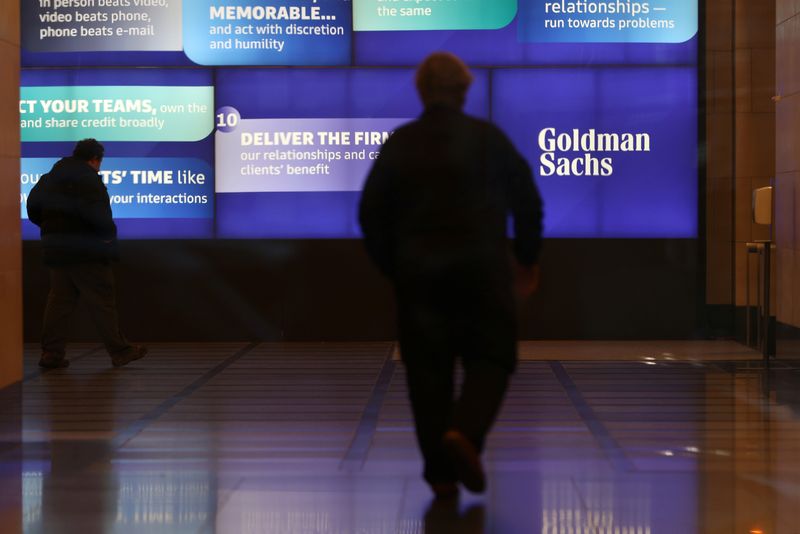By Saeed Azhar and Lananh Nguyen
NEW YORK (Reuters) -Four years after Goldman Sachs (NYSE:GS) introduced a credit card with Apple (NASDAQ:AAPL), the Wall Street giant faces a costly exit from a partnership that is seen by other lenders as too risky and unprofitable.
In searching for a buyer for its share of the partnership, Goldman will face pressure from bidders to reduce the value of its stake in order to make the price more attractive, according to two sources familiar with the matter who declined to be identified discussing potential talks.
Goldman does not break out how much its stake is worth.
The expected unwinding of the Apple-Goldman partnership is another blow for CEO David Solomon's consumer strategy, which aimed to broaden the bank's revenue beyond its traditional mainstays of trading and investment banking.
The potential writedown on the Apple card would be the latest in a string of losses from Goldman's ill-fated foray into consumer banking, analysts said. Goldman does not break out the financial details of the card business in its results.
Goldman Sachs declined to comment.
Prospective bidders will likely push Apple to change the terms of the deal, the two sources said.
They will likely seek access to Apple's proprietary credit card data, two other sources familiar with the business, said. Apple cardholders' data is not sold to third parties for marketing or advertising, according to its website.
Credit card issuers such as Synchrony Financial, Citigroup and Capital One would be logical partners to take on the venture if terms are changed, according to the two sources and another source familiar with the situation.
Synchrony declined to comment. Separately, its CEO Brian Doubles said at a conference this month that "you've got to have a really good risk-return equation" for card deals.
Citigroup declined to comment. Capital One did not respond to Reuters requests for comment.
Apple recently sent a proposal that would enable Goldman to exit the contract in the next 12 to 15 months, The Wall Street Journal reported last month, citing people briefed on the matter.
Apple said it was focused on providing an "incredible experience" for customers, but declined to comment on the Goldman deal talks or terms.
'STRATEGIC ALTERNATIVES'
After scaling back its retail ambitions last year, Solomon announced in February that Goldman was looking for "strategic alternatives" for its consumer unit.
The bank began talks with Apple under former Goldman CEO Lloyd Blankfein, who left in 2018, to create a credit card that would tap into the tech giant's enormous customer base. Stephen Scherr, who led Goldman's consumer division and later became its finance chief, was among its lead negotiators.
Solomon took the helm in late 2018 and the Apple card was introduced almost a year later. By 2022, the parties had renegotiated a deal that would last until the end of the decade, according to a person familiar with the situation.
Solomon told analysts in October that the bank was trying to get rid of the "drag" on earnings from its credit card business, which also includes a partnership with General Motors (NYSE:GM).
"Our partnerships with Apple and GM are long-term contracts," Solomon said at the time. "And we don't have the unilateral right to exit those partnerships."
Analysts interpreted his comments as a signal the card operations were losing money.
When Apple first shopped the deal with potential partners, other banks including JPMorgan Chase (NYSE:JPM) passed because their potential cut of profits was too small, according to one of the sources familiar with the matter and a separate source who was also aware of Apple's original proposal, who declined to be identified discussing private negotiations.
JPMorgan declined to comment.
New credit card businesses typically lose money in their early years, in part because regulations require banks to set aside about 7% of projected sales to cover expected losses, said Warren Kornfeld, senior vice president at Moody's Investors Service.
Goldman was responsible for setting aside the provisions for credit losses instead of sharing them with Apple, according to the two sources familiar with the business.
The Apple card also posed an underwriting challenge. Goldman's clients are typically wealthy individuals, and it had little experience making loans to less-affluent customers, according to analysts. As the two companies sought to boost revenue, they granted cards to customers with lower credit scores, according to one of the sources familiar with the situation.
As Goldman set aside more money for bad loans, the paper losses for its consumer business mounted, according to earnings filings.
The companies also tried to tempt new customers with the promise of "no annual fees, foreign transaction fees, or late fees," Apple said on its website.
They also introduced high-yield savings accounts for card holders in April, enabling Goldman to gather $10 billion of deposits by August, Apple said at the time.

Actual loan losses would eventually be shared among the two partners, one of the sources familiar with the business said. The business costs were also divided, with Apple paying for marketing while and Goldman handled customer service, the person said.
"Goldman had no meaningful presence in the credit card business," said Mike Taiano, vice president at Moody’s. "This was a big deal...they wanted to break into the card business, so they were probably willing to take less favorable economics."